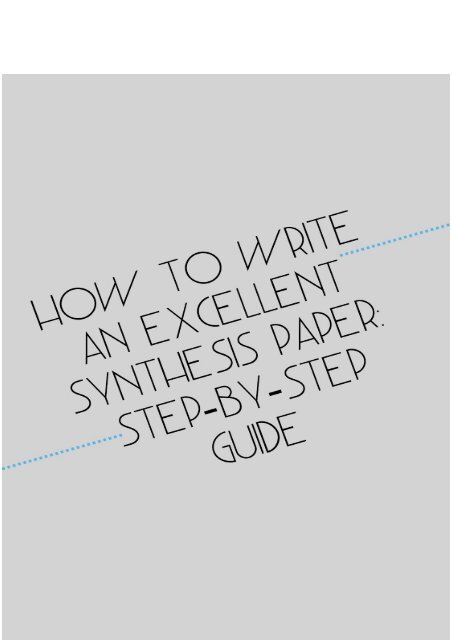How to Write an Excellent Synthesis Paper: Step-by-Step Guide
Howdy! Take a look at this article with a step-be-step guide on how to write an excellent synthesis paper. To get more details visit http://www.synthesispaper.com/
Howdy! Take a look at this article with a step-be-step guide on how to write an excellent synthesis paper. To get more details visit http://www.synthesispaper.com/
Create successful ePaper yourself
Turn your PDF publications into a flip-book with our unique Google optimized e-Paper software.
<strong>How</strong> <strong>to</strong> <strong>Write</strong> <strong>an</strong> <strong>Excellent</strong> <strong>Synthesis</strong><br />
<strong>Paper</strong>: <strong>Step</strong>-<strong>by</strong>-<strong>Step</strong> <strong>Guide</strong><br />
M<strong>an</strong>y people are frustrated <strong>an</strong>d don’t know where <strong>to</strong> begin, while in<br />
reality, writing a synthesis paper is one of the easiest things if you just follow a<br />
couple of simple steps. Writing a synthesis paper will teach you how <strong>to</strong> make<br />
compelling arguments <strong>an</strong>d present your views in a convincing m<strong>an</strong>ner. So<br />
<strong>to</strong>day, we’re going <strong>to</strong> teach you all you need <strong>to</strong> know in order <strong>to</strong> write a great<br />
synthesis paper that will leave a lasting impression on others.<br />
Easy synthesis paper writing<br />
1. First things first – choose a good title for your synthesis paper<br />
Generally speaking, a good synthesis research paper title should avoid<br />
coming across as <strong>to</strong>o general. It’s a good idea <strong>to</strong> really drill down <strong>an</strong>d focus on a<br />
very particular problematic – like for example if video games encourage<br />
violence or not, whether homeschooling is more beneficial th<strong>an</strong> public schools,<br />
<strong>an</strong>d so on <strong>an</strong>d so forth.<br />
2. Study your sources
Before you c<strong>an</strong> write in a convincing m<strong>an</strong>ner, you’re going <strong>to</strong> need <strong>to</strong><br />
study up on your sources <strong>an</strong>d do it well. By knowing what they’re all about <strong>an</strong>d<br />
always keeping in mind where a certain thing c<strong>an</strong> be found, you’re going <strong>to</strong><br />
have <strong>an</strong> easier time when writing your paper. It’s import<strong>an</strong>t <strong>to</strong> know who said<br />
what <strong>an</strong>d when, so you will be able <strong>to</strong> recall these situations <strong>an</strong>d cite them<br />
whenever needed. If you need help with synthesis essay source citing, there are<br />
numerous examples posted online that will demonstrate how easy it actually is<br />
<strong>to</strong> follow the correct format.<br />
3. Lay out your arguments<br />
Prior <strong>to</strong> writing <strong>an</strong>y word at all, you should arr<strong>an</strong>ge the thoughts in your<br />
h<strong>an</strong>d <strong>an</strong>d decide on your position. You should not only decide what you’re<br />
going <strong>to</strong> say, but also compose a pl<strong>an</strong> on how you’re going <strong>to</strong> do it. This me<strong>an</strong>s<br />
gathering all the evidence <strong>an</strong>d data that speaks in your favor. The point is being<br />
able <strong>to</strong> support your position through the use of arguments <strong>an</strong>d reason.<br />
Remember, you w<strong>an</strong>t <strong>to</strong> follow through with your thinking <strong>an</strong>d arguments.<br />
4. <strong>Write</strong> your thesis statement<br />
The next logical step is <strong>to</strong> write your thesis statement, because you will<br />
be referencing it in your synthesis essay writing in one way or <strong>an</strong>other. This<br />
should be the main thought on your mind, <strong>an</strong>d it’s going <strong>to</strong> need <strong>to</strong> be<br />
something you c<strong>an</strong> find a lot of evidence <strong>to</strong> support. If you find yourself running<br />
out if ideas, simply look at some examples online. But generally speaking, a
thesis statement should not be longer th<strong>an</strong> a single paragraph (consisting of a<br />
couple of sentences).<br />
5. An outline will help you keep your synthesis paper org<strong>an</strong>ized<br />
Remember the thesis statement you wrote in the previous step? Place it<br />
on <strong>to</strong>p. Now, it’s time <strong>to</strong> think of extra sub-arguments <strong>an</strong>d make a list of them.<br />
Remember, every argument needs <strong>to</strong> be backed up <strong>by</strong> evidence, <strong>an</strong>d this step<br />
should never be omitted.<br />
6. Be smart with you use your sources<br />
No synthesis in writing should make the mistake of presenting sources in<br />
a summarized form. Be concrete <strong>an</strong>d concise – if you make a statement, don’t<br />
be general about it <strong>an</strong>d don’t try <strong>to</strong> hide behind your words. State concrete facts<br />
<strong>an</strong>d use them <strong>to</strong> express either agreement or disagreement with a certain<br />
concept, idea, or mentality. Whatever argument you make should be supported<br />
<strong>by</strong> facts – ideally, more th<strong>an</strong> one. Although there’s nothing wrong with using<br />
just one piece of evidence if you have it, the more you c<strong>an</strong> include in a given<br />
paragraph, the stronger of a point you’re going <strong>to</strong> make. In the end, it’s all about<br />
convincing others, <strong>an</strong>d you do this through arguments <strong>an</strong>d reason, not furious<br />
emotion (neither positive nor negative will help).<br />
7. Org<strong>an</strong>ize the information in front of you <strong>an</strong>d get <strong>to</strong> work<br />
The final step pertains <strong>to</strong> the inevitable – doing the hard work yourself.<br />
But because you’ve completed all the preparations prior <strong>to</strong> starting the writing<br />
process, you’re going <strong>to</strong> have a much easier time doing all of this. It’s going <strong>to</strong><br />
be challenging, but you will no longer have <strong>to</strong> collect your thoughts because<br />
you’ve completed this step before the very beginning. Remember <strong>to</strong> make your<br />
every word count, make a compelling argument, <strong>an</strong>d keep in mind that you’re<br />
not trying <strong>to</strong> fight with <strong>an</strong>yone – you’re merely presenting your own point of<br />
view in <strong>an</strong> org<strong>an</strong>ized, structured, <strong>an</strong>d cohesive m<strong>an</strong>ner. If you make your every<br />
word count, your success is practically guar<strong>an</strong>teed.<br />
Conclusion<br />
And there we have it! By adhering <strong>to</strong> these guidelines, you’re going <strong>to</strong><br />
write <strong>an</strong> excellent synthesis paper, there’s just no doubt about it. In case you<br />
truly don’t feel comfortable doing this part yourself, there are plenty of<br />
professional writing agencies that will take care of this for you or simply give<br />
you a second opinion which you c<strong>an</strong> use <strong>to</strong> improve your writing.<br />
More information on how <strong>to</strong> write the synthesis<br />
paper are available below:<br />
https://www.synthesispaper.com/



